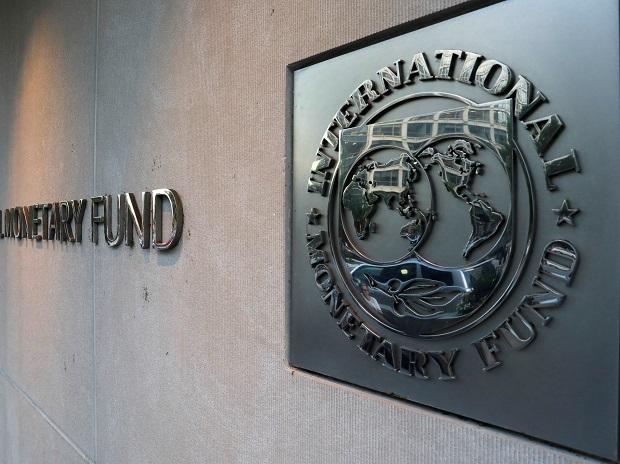The International Monetary Fund (IMF) has sharply scaled down India’s economic growth projection by 300 basis points to 9.5 per cent for the current financial year from 12.5 per cent estimated earlier in April. IMF said the downward revision is owing to “lack of access to vaccines” and possibility of renewed waves of coronavirus.
“Growth prospects in India have been downgraded following the severe second Covid wave during March–May and expected slow recovery in confidence from that setback,” IMF said in the latest edition of its flagship World Economic Outlook (WEO) report, released on Tuesday.
IMF's projections for India in the current fiscal are similar to the Reserve Bank of India's (RBI’s), but moderately optimistic than those of World Bank.
The World Bank projected India's economy to grow at 8.3 per cent in 2021 and 7.5 per cent in 2022, even as its recovery is being hampered by an unprecedented second wave of the COVID-19.
However, IMF sees India's gross domestic product (GDP) growing by 8.5 per cent, 160 basis points higher than its earlier projection, in the next financial year (FY23). Should that happen, India would become the most rapidly expanding large economy in the world with the closest competitor, China, is projected to grow by 5.7 per cent.
According to the forecast, in countries with high vaccination coverage, such as the United Kingdom and Canada, the economic impact would be mild, meanwhile countries lagging in vaccination, such as India and Indonesia, would suffer the most among G20 economies. The protracted weakness in activity is assumed to inflict persistent damage on economies’ supply capacity, it said.
IMF’s Chief Economist Gita Gopinath said, “Faster-than-expected vaccination rates and return to normalcy have led to upgrades, while lack of access to vaccines and renewed waves of Covid-19 cases in some countries, notably India, have led to downgrades.” In a blog post, she said close to 40 per cent of the population in advanced economies have been fully vaccinated, compared with 11 per cent in emerging market economies, and a tiny fraction in low-income developing countries.
IMF said that the growth prospects for emerging market and developing economies have been marked down for 2021, especially for emerging Asia. By contrast, the forecast for advanced economies has been revised upwards. These revisions reflect pandemic developments and changes in policy support.
“The forecast for the group is revised down 0.4 percentage point in 2021 compared with the April WEO, largely because of growth markdowns for emerging Asian economies.
Like in India, Similar dynamics are at work in the ASEAN-5 group (Indonesia, Malaysia, Philippines, Thailand, Vietnam), where recent infection waves are causing a drag on activity.
Meanwhile, China’s 2021 forecast is revised down 0.3 percentage point on a scaling back of public investment and overall fiscal support.
IMF has kept the the global economy projection of 6.0 percent unchanged in 2021. It has also projected global economy to grow by 4.9 per cent in 2022, up from the previous forecast of 4.4 per cent. The world output contracted 3.3 per cent in 2020.
“Although the 2021 forecast is unchanged from April, there are offsetting revisions across advanced economies and emerging market and developing economies reflecting differences in pandemic developments and policy shifts. The 0.5 percentage point upward revision for 2022 largely reflects anticipated additional fiscal support in the United States, with associated spillovers to the global economy," she said,
Gopinath emphasised on multilateral action needed to ensure rapid, worldwide access to vaccines, diagnostics, and therapeutics. This would save countless lives, prevent new variants from emerging, and add trillions of dollars to global economic growth, she said.
She cited IMF staff’s recent proposal to end the pandemic by setting a goal of vaccinating at least 40 per cent of the population in every country by the end of 2021 and at least 60 per cent by mid-2022, alongside ensuring adequate diagnostics and therapeutics at a price of $50 billion.
To achieve these targets, at least 1 billion vaccine doses should be shared in 2021 by countries with surplus vaccines, and vaccine manufacturers should prioritise deliveries to low- and lower-middle income countries. Besides, it is important to remove trade restrictions on vaccine inputs and finished vaccines and make additional investment in regional vaccine capacity to ensure sufficient production, said Gopinath
It is essential to also make available upfront grant financing of around $25 billion for diagnostics, therapeutics, and vaccine preparedness for low-income developing countries, she suggested.
 Dear Reader,
Dear Reader,
Business Standard has always strived hard to provide up-to-date information and commentary on developments that are of interest to you and have wider political and economic implications for the country and the world. Your encouragement and constant feedback on how to improve our offering have only made our resolve and commitment to these ideals stronger. Even during these difficult times arising out of Covid-19, we continue to remain committed to keeping you informed and updated with credible news, authoritative views and incisive commentary on topical issues of relevance.
We, however, have a request.
As we battle the economic impact of the pandemic, we need your support even more, so that we can continue to offer you more quality content. Our subscription model has seen an encouraging response from many of you, who have subscribed to our online content. More subscription to our online content can only help us achieve the goals of offering you even better and more relevant content. We believe in free, fair and credible journalism. Your support through more subscriptions can help us practise the journalism to which we are committed.
Support quality journalism and subscribe to Business Standard.
Digital Editor

RECOMMENDED FOR YOU